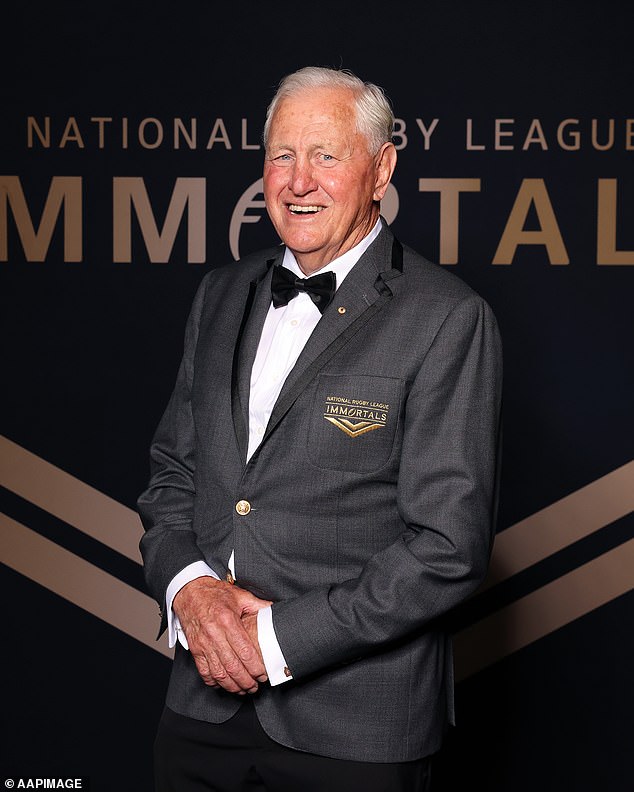On Wednesday night, Ronnie Coote gained recognition as one of the greatest rugby league players ever to grace the field, but in 1970 he was starting a controversial move that made him one of the game’s greatest villains.
Coote, one of South Sydney’s finest players, was finally named an Immortal on Wednesday night.
One of the greatest second-rowers in the history of the game, Coote played in nine grand finals and won six championships, four of them with the Rabbitohs. He played for New South Wales and captained Australia.
However, it was Coote’s polarising departure for the riches of the eastern suburbs in 1971 that coincided with the end of the Rabbitohs’ run of success and began the longest drought in the club’s history.
For 43 years, Souths fans were forced to wait for another title in 2014, in what remains the longest gap between two championships for a club in NRL history.
By the late 1970s, the back-row wanted more money from Souths after playing a key role in the club’s Grand Final victories in 1967, 1968 and 1970.
When the Bunnies rejected him, he refused to play at the start of the 1971 season and sat out five games before returning to the team and helping them win that year’s championship.
Souths’ rivals since 1908, the then Eastern Suburbs Roosters, were watching and egged on the defection that led to him being mobbed from left to right by angry Bunnies supporters.
“There was a lot of hate mail,” Coote recalled in 2013.
Ronnie Coote’s long wait to receive Australian rugby league’s highest honour – elevation to Immortal status – finally ended on Wednesday night (pictured)
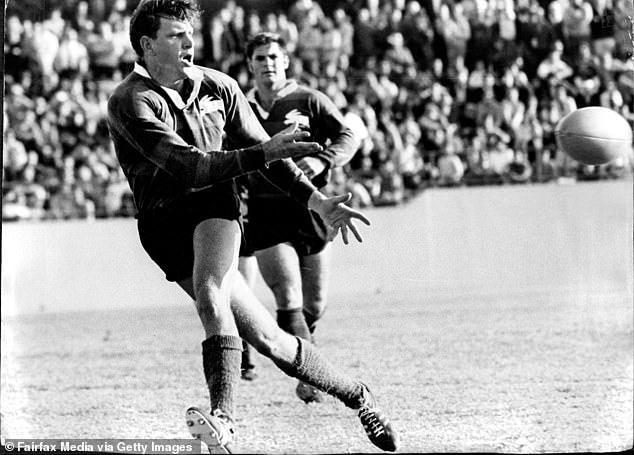
The 79-year-old first made his mark at South Sydney (pictured), where he won four championships while playing with the Bunnies between 1964 and 1971.
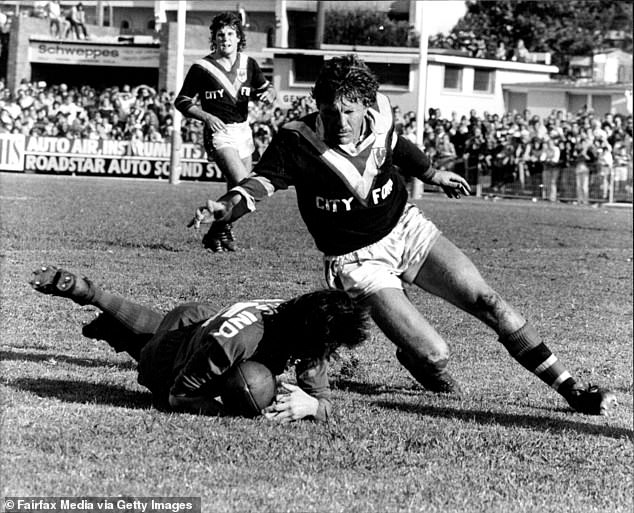
However, he moved to Souths’ arch-rivals the Roosters (pictured), becoming a villain to many footy fans, some of whom sent him shocking hate messages.
“One woman told me she was putting a gypsy curse on me. ‘You’ll never have any luck for the rest of your life,'” she said.
‘Another sent a letter saying: ‘We used to have a rabbit called Ronnie Coote and when you left, we ate him for lunch.’
Coote believes his headline-making switch has greatly intensified the feud between the two clubs, who now have what is probably the most intense rivalry in the league.
The 79-year-old was first eligible for Immortal status when the award was launched with four inaugural inductees by Rugby League Week magazine in 1981.
He was passed over for John Raper, who at the time was considered by the judges to be the best lock of the post-war era.
Graeme Langlands was long considered an Immortal in waiting, and he and Wally Lewis were brought in before Coote in 1999.
Then came Arthur Beetson in 2003, Andrew Johns in 2012 and the glut of pre-war players in 2018 alongside Norm Provan and Mal Meninga.
Meanwhile, Coote has done his thing.
The former Rabbitohs star became a McDonald’s franchisee, launched the Men of League (now Family of League) charity and had trophies named after him.
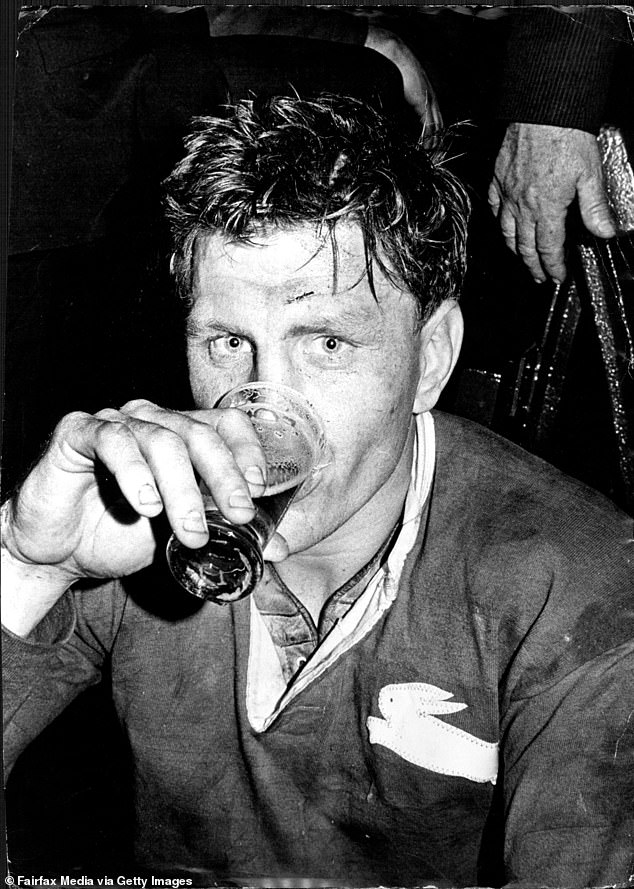
Coote (pictured during his Rabbitohs days) waited 43 years to become an Immortal, the same wait Souths endured before winning their first grand final since leaving the team.
Over the past week, the Immortal chat had become difficult for Coote to ignore as everyone repeatedly told him that he was a chance to finally be added.
“I’ve been every year they’ve done it, I’ve been on the list and they’ve never made it,” Coote said on Wednesday night.
‘I’m used to that feeling.
“If I do it, I say ‘thank you very much’. But if not, rugby league has been great to me and I think I’ve been good to rugby league.”
Perhaps fittingly, after 43 years, Coote’s wait came to an emotional and tearful end on Wednesday night, as he was named the league’s 14th Immortal.
“You have to take it in, I’m not sure how it goes,” Coote said afterwards.
‘I feel very proud to be up there with the 13 best players who have ever played. I’m very proud of that.
“I thought this wasn’t going to happen. This time it did.
“Everyone told me it was going to happen, but I wasn’t sure. I wait for things to happen before I sit back and enjoy them.”
Coote’s rise to Immortal status comes before that of Cameron Smith, Billy Slater, Darren Lockyer and Allan Langer.
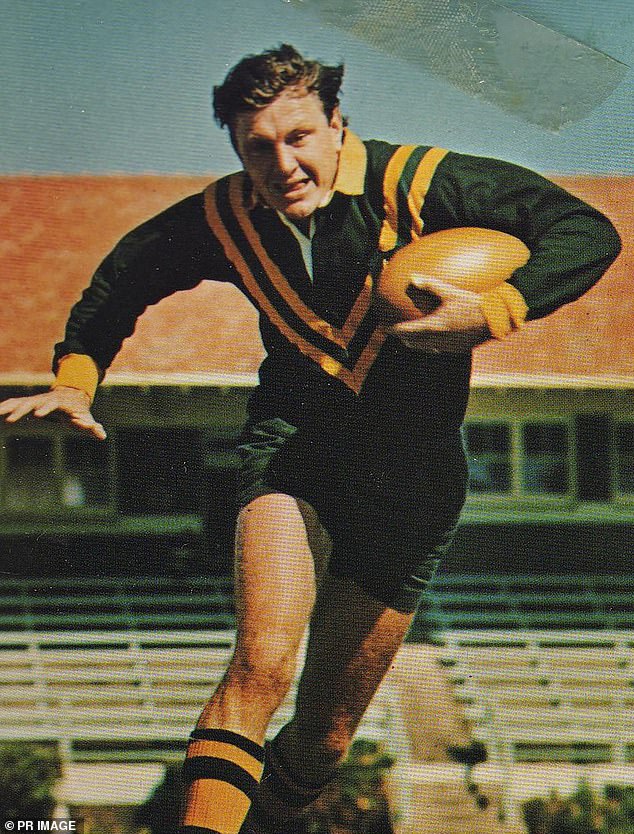
Coote also had a stellar career with the Kangaroos (pictured), representing his country on 23 occasions and scoring 13 tries in the green and gold jersey.
For most of them, Coote was a player they had only heard about and never seen.
A player from his parents’ generation, or in Smith’s case, his father’s favorite.
“When you hear people talk about his career, they say he was a phenomenal player,” Smith said before Wednesday’s ceremony.
‘My father used to talk about him, and he was his favorite player when he was a kid.
“If Ronny were to get the title of Immortal, I would be happy and so would the old man. He would be happy to see Ron get it (instead of me).”
On Wednesday night it seemed a case of now or never for Coote in terms of rugby league immortality.
Smith is unlikely to have to wait that long.
The NRL is expected to announce the next Immortal as early as 2028, with Smith the early favourite.

